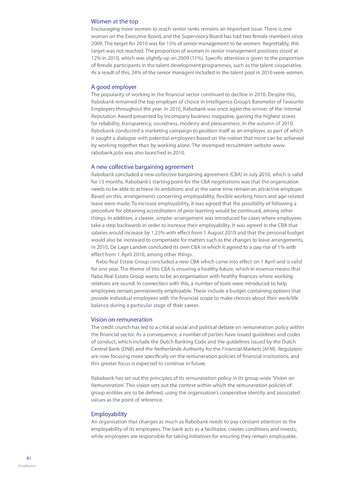Employability
Women at the top
Encouraging more women to reach senior ranks remains an important issue.There is one
woman on the Executive Board, and the Supervisory Board has had two female members since
2009. The target for 2010 was for 15% of senior management to be women. Regrettably, this
target was not reached. The proportion of women in senior management positions stood at
12% in 2010, which was slightly upon 2009 (11 Specific attention is given to the proportion
of female participants in the talent development programmes, such as the talent cooperative.
As a result of this, 24% of the senior managers included in the talent pool in 2010 were women.
A good employer
The popularity of working in the financial sector continued to decline in 2010. Despite this,
Rabobank remained the top employer of choice in Intelligence Group's Barometer of Favourite
Employers throughout the year. In 2010, Rabobank was once again the winner of the Internal
Reputation Award presented by Incompany business magazine, gaining the highest scores
for reliability, transparency, soundness, modesty and pleasantness. In the autumn of 2010,
Rabobank conducted a marketing campaign to position itself as an employer, as part of which
it sought a dialogue with potential employees based on the notion that more can be achieved
by working together than by working alone. The revamped recruitment website www.
rabobank.jobs was also launched in 2010.
A new collective bargaining agreement
Rabobank concluded a new collective bargaining agreement (CBA) in July 2010, which is valid
for 15 months. Rabobank's starting point for the CBA negotiations was that the organisation
needs to be able to achieve its ambitions and at the same time remain an attractive employer.
Based on this, arrangements concerning employability, flexible working hours and age-related
leave were made. To increase employability, it was agreed that the possibility of following a
procedure for obtaining accreditation of prior learning would be continued, among other
things. In addition, a clearer, simpler arrangement was introduced for cases where employees
take a step backwards in order to increase their employability. It was agreed in the CBA that
salaries would increase by 1.25% with effect from 1 August 2010 and that the personal budget
would also be increased to compensate for matters such as the changes to leave arrangements.
In 2010, De Lage Landen concluded its own CBA in which it agreed to a pay rise of 1% with
effect from 1 April 2010, among other things.
Rabo Real Estate Group concluded a new CBA which came into effect on 1 April and is valid
for one year. The theme of this CBA is ensuring a healthy future, which in essence means that
Rabo Real Estate Group wants to be an organisation with healthy finances where working
relations are sound. In connection with this, a number of tools were introduced to help
employees remain permanently employable.These include a budget containing options that
provide individual employees with the financial scope to make choices about their work/life
balance during a particular stage of their career.
Vision on remuneration
The credit crunch has led to a critical social and political debate on remuneration policy within
the financial sector. As a consequence, a number of parties have issued guidelines and codes
of conduct, which include the Dutch Banking Code and the guidelines issued by the Dutch
Central Bank (DNB) and the Netherlands Authority for the Financial Markets (AFM). Regulators
are now focusing more specifically on the remuneration policies of financial institutions, and
this greater focus is expected to continue in future.
Rabobank has set out the principles of its remuneration policy in its group-wide 'Vision on
Remuneration'.This vision sets out the context within which the remuneration policies of
group entities are to be defined, using the organisation's cooperative identity and associated
values as the point of reference.
An organisation that changes as much as Rabobank needs to pay constant attention to the
employability of its employees. The bank acts as a facilitator, creates conditions and invests,
while employees are responsible for taking initiatives for ensuring they remain employable.
81
Employees

